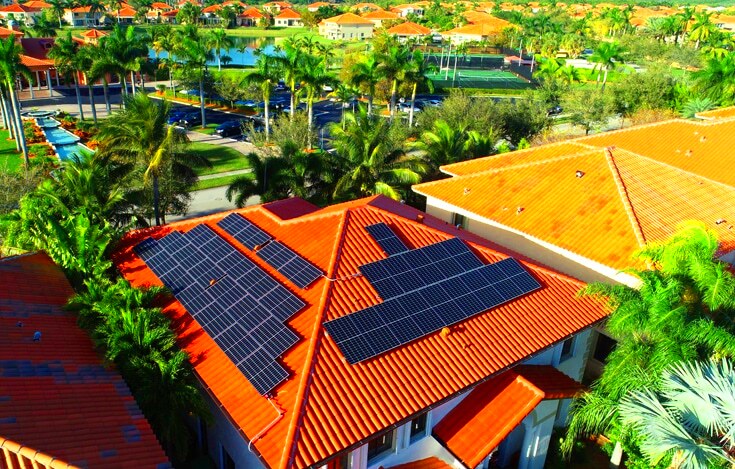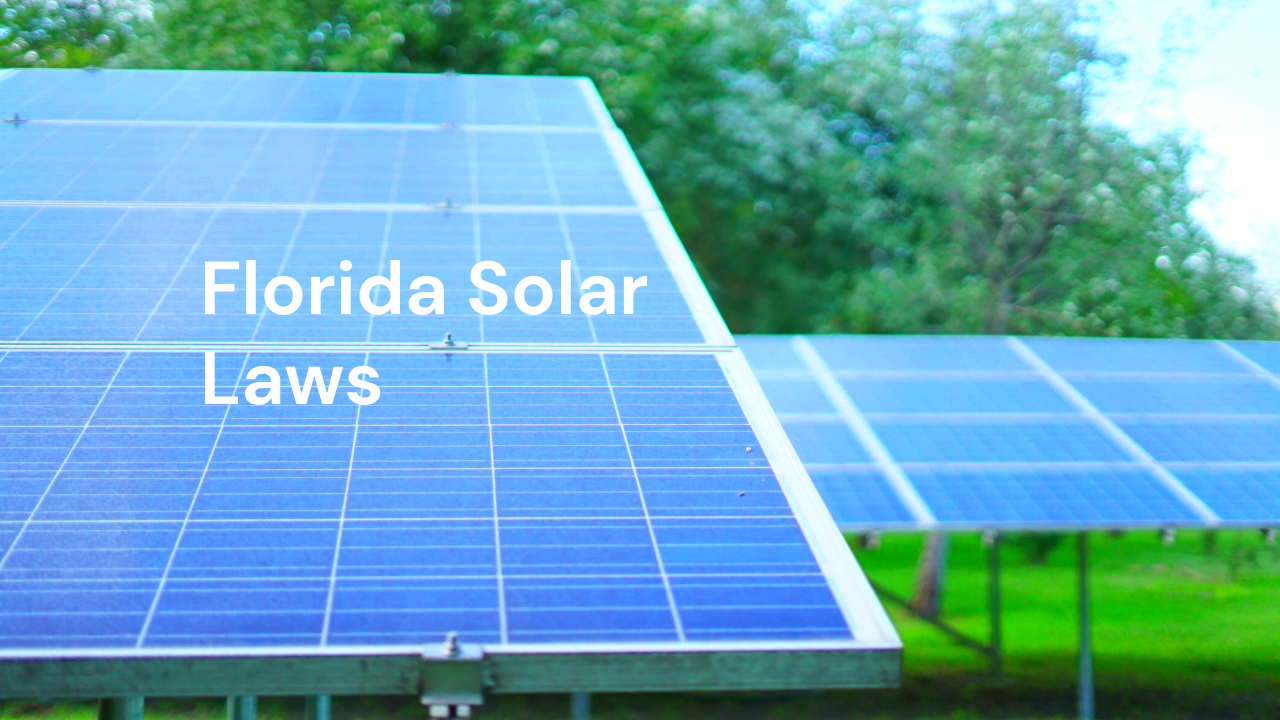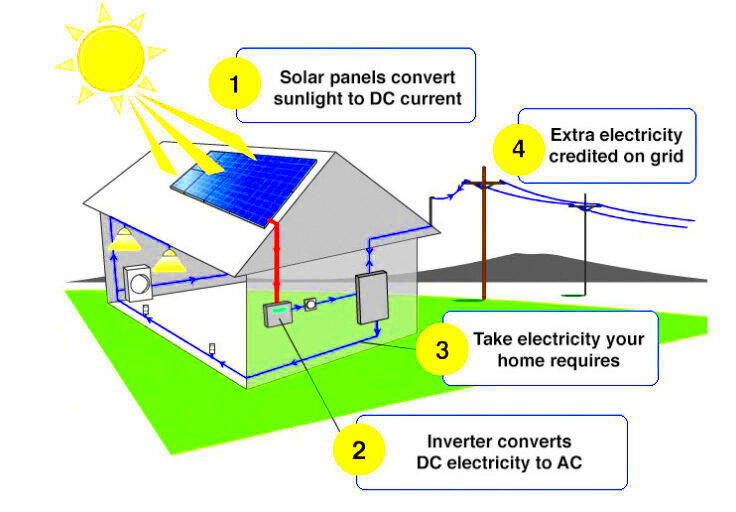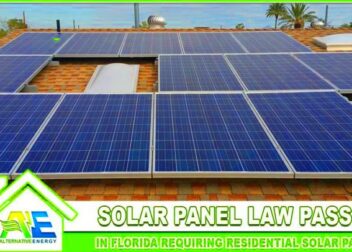Understanding Solar Panel Law in Florida
Solar energy is becoming increasingly popular in Florida, thanks to its sunny climate and numerous incentives. As more homeowners and businesses consider solar panel installations, understanding the laws governing this renewable energy source is essential. Florida’s solar laws aim to promote clean energy while ensuring safety and compliance with local regulations. In this post, we’ll explore the key aspects of solar panel law in Florida, including regulations, permitting processes, and incentives that can benefit you.
Overview of Solar Energy Regulations

Florida has specific regulations that govern solar energy use and installation. These laws are designed to encourage the growth of solar energy while protecting the interests of residents. Here are some key points:
- Florida Statute 663.04: This law allows homeowners to install solar panels without restrictions from homeowners’ associations (HOAs) that would prevent or unreasonably restrict installation.
- Building Codes: Solar installations must comply with local building codes, which ensure safety and structural integrity.
- Interconnection Standards: Utilities must follow specific interconnection standards to connect solar systems to the power grid.
- Renewable Portfolio Standards: Florida encourages utility companies to increase the use of renewable energy sources, including solar.
Permitting Process for Solar Panel Installation

Before installing solar panels, you must navigate the permitting process, which varies by county or city. Here’s a general outline of the steps involved:
- Consultation: Contact a qualified solar contractor to discuss your needs and determine the system size.
- Site Assessment: The contractor will perform an assessment to evaluate your property’s suitability for solar panels.
- Application Submission: Submit the required permits to your local government. This often includes building permits, electrical permits, and zoning approvals.
- Inspection: After installation, a local inspector will check that everything meets code requirements.
- Approval: Once the inspection passes, you’ll receive final approval to operate your solar system.
Understanding this process can help ensure a smooth installation and compliance with local regulations.
Homeowners Association Rules and Solar Panels
Homeowners associations (HOAs) can have a significant influence on solar panel installations. In Florida, laws exist to protect homeowners’ rights to install solar energy systems, but HOAs may still impose certain regulations. Understanding how these rules work is essential if you live in a community governed by an HOA.
Here are some key points to consider:
- Restrictions: While Florida law prohibits HOAs from outright banning solar panel installations, they can set reasonable restrictions. These may include guidelines on panel placement, aesthetics, and visibility.
- Approval Process: Many HOAs require homeowners to submit plans for review before installation. It’s important to check your HOA’s guidelines to ensure compliance.
- Design Standards: HOAs may have specific design standards for solar panels, such as color, style, and placement. This helps maintain the community’s visual appeal.
- Community Awareness: Engaging with your HOA can promote a better understanding of solar energy benefits, which may lead to more supportive policies.
Overall, knowing your rights and the HOA’s rules can help you navigate the installation process smoothly, ensuring you can harness solar energy while adhering to community standards.
State Incentives and Tax Credits for Solar Energy
Florida offers several incentives and tax credits to promote solar energy adoption. These programs can significantly reduce the overall cost of solar panel installations. Here are some of the main incentives available:
| Incentive | Description |
|---|---|
| Federal Solar Investment Tax Credit (ITC) | Allows homeowners to deduct a percentage of the cost of installing a solar energy system from their federal taxes. |
| Florida Property Tax Exemption | Solar energy systems are exempt from property taxes, meaning your property value won’t increase due to the solar installation. |
| State Sales Tax Exemption | Purchasing solar equipment is exempt from state sales tax, providing additional savings on your investment. |
| Net Metering | Allows homeowners to receive credits for excess energy generated by their solar panels, offsetting future energy costs. |
These incentives can make solar energy more accessible and affordable for Floridians, making it a smart choice for sustainable energy.
Net Metering and Its Benefits
Net metering is a crucial policy that allows homeowners with solar panels to get credit for the excess electricity they produce. This system can lead to significant savings on your utility bill. Here’s how it works:
- Electricity Generation: When your solar panels generate more energy than you use, the surplus is sent back to the grid.
- Credits Earned: For every kilowatt-hour (kWh) you send back, you earn credits on your utility bill. These credits can offset your electricity costs when you draw from the grid.
- Monthly Balance: At the end of each billing cycle, your utility company calculates your net energy use. If you generated more electricity than you used, you’ll see a reduced bill or even no charge at all.
- Long-term Savings: Over time, net metering can lead to substantial savings, making solar energy a cost-effective choice for homeowners.
Net metering not only helps reduce electricity costs but also encourages the use of renewable energy. By participating in this system, you contribute to a cleaner environment while enjoying financial benefits.
Challenges and Common Legal Issues
As solar energy becomes more popular in Florida, homeowners may face several challenges and legal issues related to solar panel installations. Understanding these potential hurdles can help you navigate the process more effectively. Here are some common challenges:
- HOA Restrictions: As mentioned earlier, homeowners associations may impose restrictions that can complicate the installation of solar panels. Homeowners must be aware of these rules and work within them.
- Zoning Laws: Local zoning laws can affect where solar panels can be installed. It’s important to check with local authorities to ensure compliance.
- Utility Company Policies: Different utility companies may have varying policies regarding solar installations, including interconnection requirements and net metering rules.
- Contractor Disputes: Homeowners might encounter issues with solar contractors, such as disagreements over pricing, installation quality, or warranty claims.
- Financing Issues: Securing financing for solar installations can be tricky, and homeowners should carefully review loan terms and conditions to avoid potential pitfalls.
By being aware of these challenges, homeowners can take proactive steps to ensure a smoother solar installation experience and minimize legal issues.
Future of Solar Energy Law in Florida
The future of solar energy law in Florida looks promising, with ongoing developments aimed at promoting renewable energy. Here are some trends and potential changes that could shape the solar landscape:
- Increased Incentives: As the demand for solar energy grows, lawmakers may introduce more incentives to encourage installations, such as additional tax credits or rebates.
- Improved Regulations: Expect ongoing updates to regulations that streamline the permitting process, making it easier for homeowners to go solar.
- Community Solar Programs: There is a growing interest in community solar projects that allow multiple homeowners to share the benefits of a solar installation, making it more accessible for those who can’t install panels on their property.
- Environmental Legislation: Future legislation may focus on reducing carbon emissions and increasing renewable energy standards, further promoting solar energy.
With these potential changes, Florida is likely to continue evolving as a leader in solar energy, providing more opportunities for homeowners and businesses to benefit from this clean energy source.
FAQs about Solar Panel Law in Florida
When it comes to solar panel law in Florida, many homeowners have questions. Here are some frequently asked questions:
- Can my HOA prevent me from installing solar panels? No, Florida law protects your right to install solar panels. However, HOAs can set reasonable restrictions regarding aesthetics and placement.
- What permits do I need to install solar panels? The permits required vary by location but typically include building permits and electrical permits. Always check with your local government.
- How does net metering work? Net metering allows you to earn credits for the excess energy your solar panels produce. These credits can offset your future electricity bills.
- Are there tax incentives for solar energy? Yes, Florida offers various tax incentives, including federal tax credits, property tax exemptions, and sales tax exemptions.
- What should I do if I have a dispute with my solar contractor? Start by discussing the issue directly with your contractor. If you can’t resolve it, consider mediation or legal advice if necessary.
These FAQs can help clarify common concerns and provide valuable information for homeowners considering solar energy in Florida.
Conclusion on Solar Panel Law in Florida
Understanding solar panel law in Florida is essential for homeowners looking to harness the power of solar energy. With a supportive legal framework, various incentives, and protections against restrictive HOA rules, Florida is making strides in promoting renewable energy. However, it’s important to be aware of potential challenges such as local regulations and contractor disputes. As solar energy continues to gain popularity, we can expect ongoing improvements in laws and incentives, making solar energy even more accessible. By staying informed and proactive, homeowners can enjoy the benefits of solar power while contributing to a cleaner environment.

